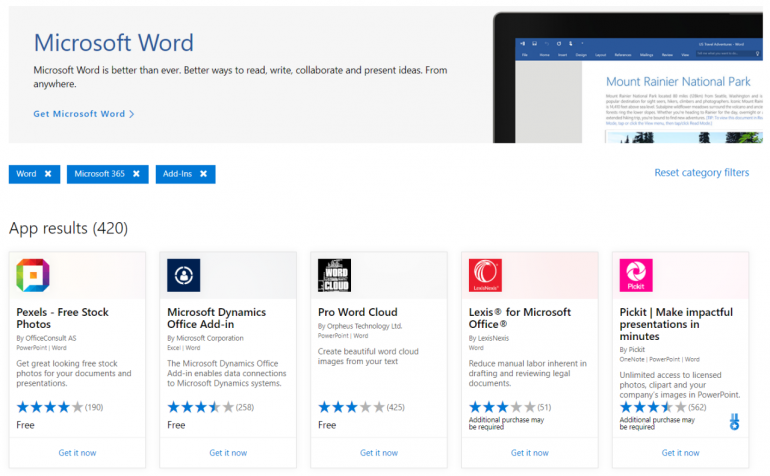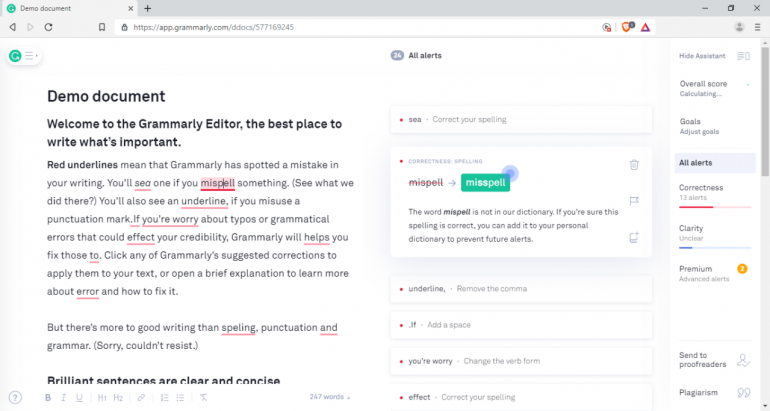Writing is one of the most exciting skills you can learn. First, it’s a craft that’s always transforming, as language itself is ever-changing. Secondly, distinct pieces require different styles of writing – you don’t write a blog article about dating apps the same way you write an essay about the history of crime in the U.S. In other words, writing as a job is everything but monotonous. On the flip side, this also means that it’s a skill that is hard to learn. Fortunately, we live in a digital era where there are various apps to help.
Microsoft Word
Everyone knows about Microsoft Word. Even people who don’t use Windows as their operating system use it. It’s easy to understand why: the app is easy to use, it syncs seamlessly with other Microsoft services, and comes pre-installed in most computers. However, what many people don’t know is how to use it properly. Sure, the app already comes with proof-reading for your language installed. But did you know you can download dictionaries for other languages for free? Moreover, Word allows you to upload custom dictionaries made by third parties (such as yourself) with their own wording and sentence rules. This way, if you have a specific way of writing, you can make Word correct your text accordingly.

Another thing people seem to forget is that Word supports countless free plugins. WritingAssistant, for example, is an AI technology that analyzes your text and flags errors, offers suggestions, and even considers coherence metrics. Other plugins you might want to try out are Read My Document, Copyleaks Plagiarism Checker, Word Training and Tips, and I Should Be Writing. The options are endless, so you should spend some time scrolling through the add-ons list to find the ones that best suit your needs.
Grammarly
You can do a lot with Word. However, when compared to Grammarly, Word feels like a lackluster piece of software (even when you install various language improvement add-ons). By allowing you to select the type of target audience, formality level, writing style, desired tone, and the piece’s intent, Grammarly is capable of providing tailored writing suggestions for your specific needs. In other words, if you set Grammarly up correctly, the way it corrects your formal emails will be completely different from how it corrects a casual blog article. Better still, all suggestions come with comprehensive explanations on why you should change your text to the recommendation provided. This is extremely important, as your writing will organically improve without you realizing it, and after a while you may not even need the app anymore.

Grammarly’s free version checks for spelling, grammar, and punctuation mistakes. However, when you upgrade to a paid subscription, it also warns you about clarity, engagement, and delivery improvements. On top of that, it comes with a built-in plagiarism checker that compares your text with over 16 billion websites. The software also works on any type of device and integrates with all modern browsers and other text editors like Word.
Google Keyword Planner and SEMrush
 If you write content online, then there’s something that is essential – search engine optimization. While there are various aspects of SEO to consider, one of the main ones is to incorporate keywords your target audience is searching for in your copy. This doesn’t mean you should change your writing entirely, but just including a few keywords and adequate variants can increase the number of views on your website tremendously. There are plenty of tools that help you find the most searched keywords for any given topic. We recommend SEMrush and Google Keyword Planner. Although the former is quite expensive, it’s by far the most comprehensive SEO solution on the market. On the other hand, Google Keyword Planner is completely free and since it’s from Google itself, you can be sure that the numbers are accurate.
If you write content online, then there’s something that is essential – search engine optimization. While there are various aspects of SEO to consider, one of the main ones is to incorporate keywords your target audience is searching for in your copy. This doesn’t mean you should change your writing entirely, but just including a few keywords and adequate variants can increase the number of views on your website tremendously. There are plenty of tools that help you find the most searched keywords for any given topic. We recommend SEMrush and Google Keyword Planner. Although the former is quite expensive, it’s by far the most comprehensive SEO solution on the market. On the other hand, Google Keyword Planner is completely free and since it’s from Google itself, you can be sure that the numbers are accurate.
Google Analytics
Understanding how your readers behave when they’re browsing your website is also vital to improve your content. And, while there are plenty of companies providing such services, Google Analytics continues to be the favorite among most content writers, and for good reason. It’s completely free and provides comprehensive reports that allow you to understand your readers’ path in detail.
Content Project Manager Apps
 If you’re working within a team, then you’ll need a project management platform like Asana, as it makes the process of writing, editing, drafting, and publishing as smooth as possible. Users can create tasks with various subtasks, assign them to their colleagues, and integrate the software with several platforms like Word, Hubstaff, and many more. This creates a seamless workflow that will save your team precious time and energy.
If you’re working within a team, then you’ll need a project management platform like Asana, as it makes the process of writing, editing, drafting, and publishing as smooth as possible. Users can create tasks with various subtasks, assign them to their colleagues, and integrate the software with several platforms like Word, Hubstaff, and many more. This creates a seamless workflow that will save your team precious time and energy.
Leave a Reply